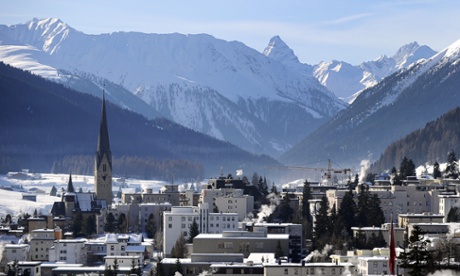
In Davos, Switzerland, the elite will not put up with anything other than perfect ski slopes – even if the climate change they are helping to create is stopping nature from doing the task herself.
The World Economic Forum kicks off today surrounded by mountain slopes that owe some of their beautiful whiteness to 380 massive snow canons that have spent months pumping out hundreds of millions of litres of cold water mixed with air. It’s a powerful metaphor.
As Florian Grimm, the local head of snow management, told a colleague recently: “Today nobody would accept stones any more, or spots of grass in spring. They just want to have white from the top to the valley, and they know we have a system to do this.”
Despite all the talk, the wealthy elite gathered in Davos gain too much status, wealth and power from the maintenance of our destructive economic system to spearhead its transformation.
I was discussing this issue yesterday with Nick Robins, co-director of UNEP’s inquiry into a sustainable finance system. He says the snow canons are a perfect analogy for the state of mind of political and business leaders – which is to prop up the existing system for as long as possible. That, of course, cannot succeed because denial hastens the very collapse they seek to avoid. We need a new way of thinking and we need it fast.
“Creating man-made snow to keep the ski slopes open is what reactive adaptation looks like in reality,” says Robins. “Clearly we are going to need to work much more creatively to respond to the sustainability challenges rushing towards us and get to the root of the problem.”
I also spoke to climate expert Jorgen Randers, co-author of the seminal 1972 report Limits to Growth, who worries about the lack of creative thinking at the gathering of powerful global leaders. “I am afraid the results will be limited, because Davos – for ideological reasons – tends to constrain itself to actions that are profitable from a business point of view. What is needed to solve the climate problem is a strong state which can put in place solutions that are not profitable, nor cost effective when using conventional measures.”
This is not to decry the successes of the World Economic Forum, which Dominic Waughrey, WEF’s head of public-private partnerships, highlighted this week. It also is not to suggest that the business leaders attending Davos are bad people. They are not, and the more progressive leaders deserve respect for their attempts to bring about change.
But most have been seduced by their lofty position in society: their wealth insulates them from the consequences of their actions.
Perhaps we should coin a new phrase, “the prosperity trap”, for it is psychologically as debilitating in its own way as the poverty trap (although such a comparison in everyday life would be grotesque). For this reason, Davos, the winter playground of the rich, is perhaps one of the worst places in the world to bring together global leaders – because there is not the merest hint of the poverty suffered by billions of people.
Without emotional connections, these leaders – the vast majority of whom are men – will use their intellectual prowess to find solutions with little attention trickling down to the greatest agent of change: our hearts.
Tim Haywood, group finance director of Interserve, a multinational support service and construction company based in the UK, recently described how he woke up to the need to take action on sustainability only after his daughter repeatedly voiced her concerns. If only more children of the elite would shake off the shackles of entitlement and take the battle to limit climate change and social injustice to the breakfast table.
Rather than only looking for solutions, it would also be a good idea for Davos delegates to start asking better questions. At a recent gathering of sustainability experts, someone took the disruptive step during a break of refashioning the scores of sticky notes highlighting upcoming specialist sessions into the words “we don’t know”.
As Davos convened for 2015, Adriaan Kamp, founder of Energy For One World, said: “We need a revolution. We need to instil a new spirit in our companies, society and economies. Our present constellation of leadership and status quo simply won’t do. They have failed. The elite can’t change the elite. So the better question to ask ourselves is how we, the professionals in business and society, can organise ourselves differently to clean up this mess? How can we organise for true success and a true new growth?”
Taking time to ponder questions such as these may be the most important activity this week in Davos. The answers that will emerge over time will help determine the world we live in.
Thomas Mann, who visited Davos in the early 20th century, marvelled in his novel The Magic Mountain at “the towering marble statuary of the high Alps in full snow”. As the participants in Davos roll up their sleeves up and get to work, let them hold that image in their mind and recognise how important it is that those born in the 22nd century are able to witness such extraordinary majesty and get a taste of heaven on earth.
This year’s Davos coverage is funded by The B Team. All content is editorially independent except for pieces labelled “brought to you by”. Find out more here.

